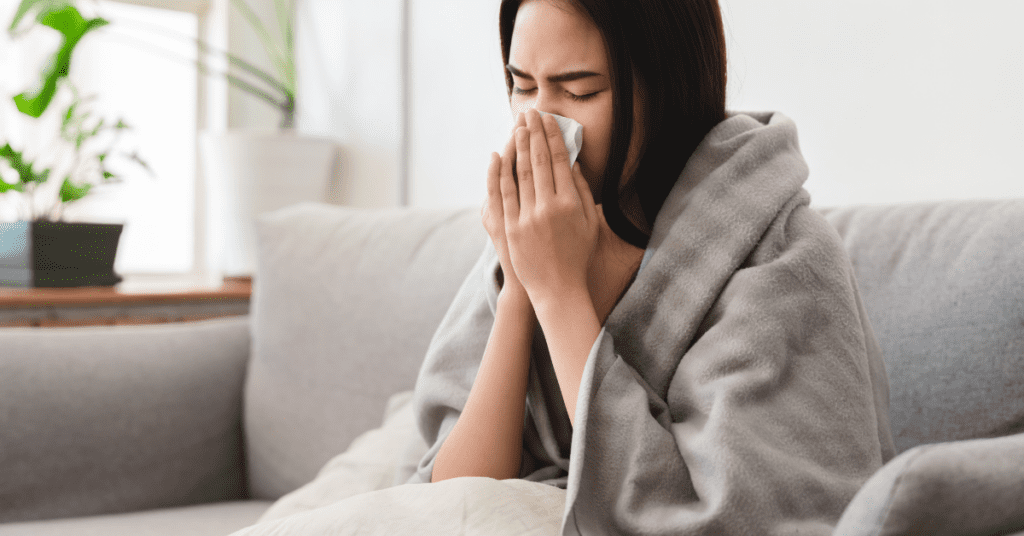Cough and cold is a common condition widespread nowadays. This ailment not only brings physical discomfort but also can disrupt your entire day.
There are numerous traditional home remedies for the common cold and cough have been handed down through generations and are highly regarded for their effectiveness in initiating the healing process. If you wish to experience faster relief, incorporate some of these remedies.

Home Remedies for Cough and Cold Using Ayurveda Methods
Tulsi (Holy Basil): In Ayurveda, Tulsi is highly regarded as the “Mother Medicine of Nature”. Tulsi leaves can aid in enhancing the body’s ability to combat the common cold and cough. Tulsi promotes the production of antibodies, which helps in preventing infections. It also possesses properties that relieve cough by soothing the airways and aiding in the removal of sticky mucus.
Chew 4-5 tulsi leaves as the first thing in the morning. You can continue to consume Tulsi leaves regularly to boost your immunity.
Honey: Honey isn’t just delicious; it’s also great for your throat and acts as a potent cough reliever due to its strong antimicrobial properties. Honey can alleviate chest congestion by loosening thick mucus, making it easier for you to cough it out. This is particularly helpful for reducing wet cough.Before bedtime, take a teaspoon of honey to lessen the intensity of your cough. Keep doing this until your cough improves.
Mulethi (Licorice): Mulethi, also known as “Sweet wood,” is a beneficial Ayurvedic remedy for cough. Mulethi powder is effective in managing a sore throat, cough, and excessive mucus in the airways.
Mulethi acts as an expectorant, thinning and loosening the mucus in the airways. This makes coughing easier and reduces congestion. Take one teaspoon of Mulethi powder and mix it in a glass of warm water. Consume this mixture twice a day.
Sonth (Dry Ginger): Dry ginger, commonly referred to as sonth, sukku, or soonth, is a key component in herbal cough syrups. When consumed with honey, sonth serves as a comforting solution for coughs and colds.Sonth contains specific compounds that possess anti-inflammatory properties. This helps in alleviating a sore throat. Sonth with honey: Combine 1/4 teaspoon of sonth with 1 teaspoon of honey, blend thoroughly, and consume this mixture twice daily for a minimum of three days.
Diet and Nutrition
Ayurveda places great importance on a balanced diet to maintain overall health, including respiratory health. During a cough and cold, it’s essential to follow these dietary guidelines:
Warm, Light Foods: Consume warm, easily digestible foods like soups, and stews. Avoid cold and heavy foods, which can exacerbate symptoms.
Honey: Ayurveda considers honey a natural elixir for respiratory health. It can be added to warm water to soothe the throat and reduce cough.
Avoid Dairy: Dairy products can increase mucus production, so it’s best to avoid them during a cold. Opt for dairy-free alternatives.
Spices: Incorporate spices like black pepper, cumin, and fenugreek into your meals, as they can help alleviate symptoms and boost immunity.
Lifestyle Changes
Ayurveda emphasizes the importance of a healthy lifestyle in preventing and managing cough and cold. This includes:
Adequate Rest: Getting sufficient rest helps the body recover and heal more effectively.
Hydration: Stay well-hydrated with warm water, herbal teas, and hot soups to keep the respiratory passages moist.
Pranayama: Breathing exercises like Pranayama can improve lung function and promote overall wellness.
Oil Pulling: Swishing warm sesame oil in your mouth for a few minutes each morning can help maintain oral and respiratory health.
It’s important not to attempt all the treatments at once. Take the time to assess what your body requires and proceed carefully, taking into account your individual health conditions. Many mild to moderate cold symptoms can be managed with home remedies. Nevertheless, if your cough and cold become severe or last for more than 2-3 weeks, it’s crucial to promptly consult a healthcare professional who can provide appropriate treatment and prescribe necessary medications. This will not only help alleviate your illness but also promote your general health and well-being.
Stay Safe, Stay Healthy!






